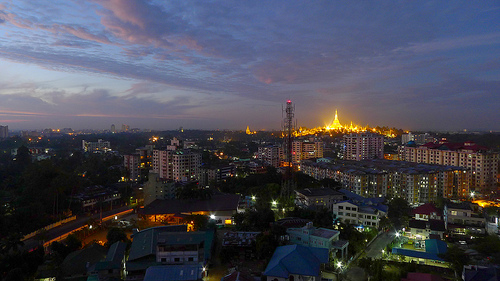A symposium of higher education institutions and agencies from Britain and Myanmar – including British Council, the Leadership Foundation for Higher Education and the Quality Assurance Agency – met in the city of Yangon, Myanmar earlier this week to discuss ways of building academic partnerships between both countries.
News and business analysis for Professionals in International Education
Have some pie!
Myanmar ed budget doubles; UK fortifies ties
 Yangon, Myanmar hosted the latest policy dialogue between Britain and the nation's education sector.
Yangon, Myanmar hosted the latest policy dialogue between Britain and the nation's education sector. Myanmar also intends to tour Australia, India and Thailand to learn how higher education is governed and implemented in these countries
The two-day event on 28 and 29 October organised by University of London opened with comments from Myanmar’s Acting Union Minister for Education, Dr Myo Myint and the university’s Vice Chancellor Professor Sir Adrian Smith who said:
“By building academic links between institutions in the UK and Myanmar, the dialogue hopes to increase participation and build strong international links within the higher education system.
This in turn will help contribute to Myanmar’s socio-economic goals, and foster greater educational opportunities for its citizens.”
Titled as ‘UK-Myanmar higher education partnership: turning policy into action,’ discussions covered –academic autonomy – previously banned by the country’s military juanta, quality assurance, distance education – 60% of Myanmar’s enrolled students are distance learners – and transparency across university governance in finance, admission, and assessment.
So far any mention of partnerships have alluded specifically to the University of London, although the University of Nottingham and Liverpool John Moores University were also present at the conference.
“We are discussing ways in which University of London International programmes could be supported in Myanmar and how the Centre for Distance Education within the University of London International programmes could work with Yangon and Mandalay Distance Universities” Tim Gore, the Director of Global Networks and Communities at the University of London International Programmes told The PIE News.
This week’s talks is the third in a series of dialogues – the first was held at the University of London in April this year, the second was held in Yangon in June, led by the British Council.
The sessions allow Myanmar to glean best practices from Britain’s higher education system and finds ways to implement them its own higher education landscape, which is supported by around 1% of the country’s GDP.
With a parliamentary committee currently redrafting the country’s higher education legislation in order to meet Association of Southeast Asian Nations and international standards, Myanmar is making every effort to distance itself from the fragmented educational legacy its military juanta left behind.
In a show of commitment to reformation, Dr Myo Myint announced earlier this year, a 107% increase in the national budget for education boosting it from $340 million to $740 million.
In 2012 the Myanmar government launched a Comprehensive Education Sector Review (CESR) consisting of five working groups covering basic, technical, vocational, non-formal and higher education as well as policy and financing.
The review has completed a quick assessment of the sector and will embark on an in depth analysis.
Initial problems the CESR has highlighted include Myanmar’s 168 universities falling under 13 different ministries. 64 universities – the highest number –are linked to the Ministry of Education, 61 to the Ministry of Science and Technology and 15 to the Ministry of Health.
Other countries extending a helping hand to reform Myanmar’s education sector include India – pledged some 12 Memoranda of Understanding covering partnerships and education on information technology – Australia’s former foreign minister Bob Carr pledged aid to Burma promising a flow of $100 million annually by 2015 and the US, which sent the largest delegation of its universities to Myanmar in February this year.
Still looking? Find by category:


